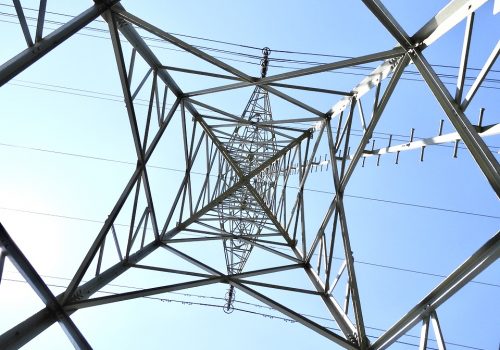As the global community continues to grapple with the coronavirus (COVID-19), the Atlantic Council is open for business. Our business, meetings, and events, however, are occurring virtually. For more information, please read an update from our President and CEO.
Energy is critical to military operations. Fuel—primarily fossil fuel—is what enables personnel movement, cargo transport, command communications, and weapons deployment. The US military is pursuing the acquisition and development of cutting-edge technologies and processes that will minimize the dependency on fossil fuels and increase future readiness. As energy technologies evolve, some challenges for military logistics will subside while others will emerge, such as interoperability among allied forces. Expert panelists discuss issues and opportunities in operational energy and energy security for the US military and its NATO partners.
Event recap
On September 15, 2020, the Atlantic Council Global Energy Center and Scowcroft Center Forward Defense hosted The Hon. Sharon Burke, senior adviser for the international security and resource security programs at New America and former assistant secretary of defense for operational energy; Roberto Guerrero, deputy assistant secretary of the Air Force for operational energy; Julijus Grubliauskas, energy security officer at NATO Emerging Security Challenges Division; and Lieutenant General Eric Wesley (US Army, Ret.), former deputy commanding general of US Army Futures Command and former director of the Futures and Concepts Center at US Army Futures Command. Margaret Jackson, deputy director for climate & advanced energy at the Atlantic Council Global Energy Center and former surface warfare officer in the US Navy, provided opening remarks and moderated the discussion.
The aim of this discussion was to evaluate how the armed forces are adapting and improving energy supply logistics in US and allied military operations. The panelists also went into depth about the significance of the energy transition for military planning, operations, and joint cooperation with focus on the US Air Force, US Army, and NATO. The panel recognized that current military engagements are likely to take place in a contested, expeditionary environment where logistical reliability is not guaranteed. Panelists highlighted two main points that will shape the future of operational energy: we can greatly reduce the energy logistics supply chain by generating energy at the site of the battlefield, and distributed energy and emerging technologies like microgrids will build energy independence and resilience into mission operations.
After a brief introduction by Margaret Jackson, The Hon. Sharon Burke provided an overview of operational energy. The 2008 Defense Authorization Act defined operational energy as “the training, moving, and sustaining of military forces and weapons platforms for military operations,” and although operational energy is a contemporary concept, Burke pointed out that energy has always been an important factor in warfare as both a shaping influence and input. Modern battlefields are often expeditionary with little to no rear area, leaving supply lines vulnerable to attack, with fuel serving as a limiting factor to operational efficacy. She affirmed that while operational energy emerged in response to counterterrorism and counterinsurgency operations in Afghanistan and Iraq, a whole new theater of operations now exists today that necessitates different considerations, developments, and innovations.
The panel then evaluated which energy developments will be most transformational for the future of warfare. Roberto Guerrero described two primary ways in which the US Air Force is working to improve operational efficiency: first, by transitioning missions from larger, fuel-heavy aircraft to smaller aircraft; and second, by identifying and improving the data collection, storage, and analytical capabilities of aviation operational assets. Lieutenant General Eric Wesley insisted that operating in a distributed manner, both tactically and with regard to energy, is the best way to reduce the number of vulnerabilities and lower the risks for combat forces. Juljius Grubliauskas also affirmed that for NATO, the energy transition is an adaptation and interoperability challenge. As a multilateral alliance that provides for the collective defense of thirty countries, NATO must be ready to mobilize large numbers of troops and massive quantities of supplies at any given time. Grubliauskas asserted that increasing interconnectivity and expanding distributed energy resources would ultimately improve security and minimize the logistical burden on a particular host nation. Even basic differences, like the type of power plug used across allied nations, must be taken into account.
Audience participants inquired about specific military innovations in energy and the extent to which NATO and the US armed forces have succeeded in improving operational energy logistics. Burke pointed out that the Office of the Secretary of Defense is looking at a $500,000 investment called Project Pele, which would develop mobile nuclear reactors for power generation on the battlefield. She stressed the importance of making improvements on the front end of the process, when the military is undergoing concept development, threat definition, wargaming, modeling, and simulation. Wesley predicted that across the formation, one could reduce fuel usage by about 47 percent if you move marginally towards electrification solutions. And Grubliauskas mentioned that NATO allies increasingly plan, train, build, and test compatibilities together, as well as develop common standards to align differing NATO-member technologies. In looking back, Burke underscored that the US DoD “has not made as much progress as one would hope.” Other panelists echoed this sentiment, and Wesley stated that “there are improvements, but they are marginal.”
Agenda
A conversation with
The Hon. Sharon Burke
Senior Adviser, International Security Program and
Resource Security Program
New America;
Former Assistant Secretary of Defense for Operational Energy
US Department of Defense
Roberto Guerrero
Deputy Assistant Secretary of the Air Force for Operational Energy
US Department of the Air Force, Office of the Assistant Secretary of the Air Force for Installations, Environment, and Energy
Julijus Grubliauskas
Staff Officer, Hybrid Challenges and Energy Security Section
NATO Headquarters, Emerging Security Challenges Division
LTG Eric Wesley, USA (Ret.)
Former Deputy Commanding General;
Former Director, Futures and Concepts Center
US Army Futures Command
Moderated by
Margaret Jackson
Deputy Director, Climate & Advanced Energy
Atlantic Council Global Energy Center
Related experts
Learn more about the Global Energy Center

The Global Energy Center develops and promotes pragmatic and nonpartisan policy solutions designed to advance global energy security, enhance economic opportunity, and accelerate pathways to net-zero emissions.





